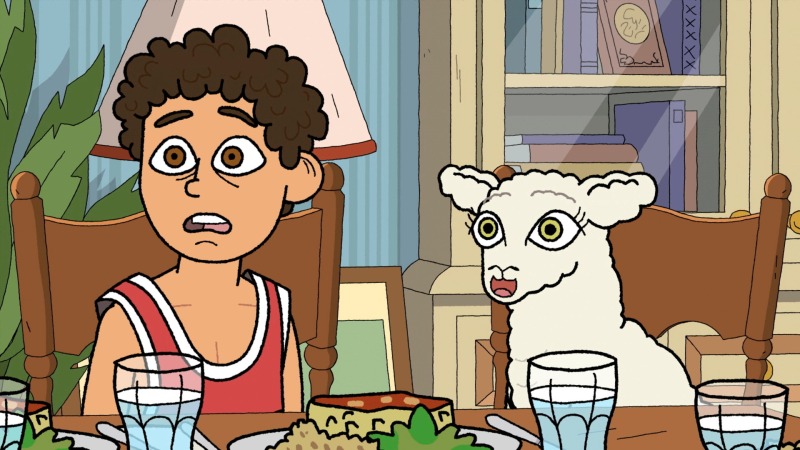Ramy Youssef’s #1 Happy Family USA Is a 21st Century Coming-of-Age Sitcom

When a new work of art has a certain relevancy to the front page of the day’s newspaper, it is often too easy to get lost in drawing connections—or in commenting on how a work meets the moment, celebrating the foresight and serendipity of something that seems to speak directly to the zeitgeist. #1 Happy Family USA is one such work.
Sometimes the possibility that a show’s greatness would be true regardless of its prophetic nature gets lost in that praise. Because as #1 Happy Family USA (set in the days after September 11, 2001 and pitched at the end of the first Trump term) demonstrates, the fascistic targeting of immigrants today is but another chapter in the American tradition of racism and xenophobic hate.
Co-created and -written by Ramy Youssef and South Park veteran Pam Brady, the animated sitcom begins on September 10, 2001. Rumi Hussein (Youssef) lives the typical life of a New Jersey middle-schooler in the early 2000s: he is obsessed with Michael Jordan and the Chicago Bulls (though he wears a knock off jersey that says “Balls”), frets over a school project he must deliver on Egypt (the country from which his family is from), and crushes on his teacher, Mrs. Malcolm (Mandy Moore).
We also get pre-9/11 introductions to the rest of the family. Rumi’s father, Hussein Hussein (also voiced by Youssef), is a trained doctor, but after immigrating operates a Halal cart near Rockefeller Center (outside the News Corp. building), which he proudly shows off to the recently arrived and cheery Uncle Ahmed (Paul Elia). His mother, Sharon (Salma Hindy), works at a dentist’s office and still actively grieves Princess Diana. Rumi’s older sister, Mona (Alia Shawkat), is a high schooler with a secret girlfriend. They plan to both publicly come out the next day, as they were born on the 9th and 11th respectively.
The first episode of the series is a mad dash to introduce all of these characters (and more) to set the stage for what is to come. Once the date is made clear, a devastating dichotomy ensues, as the family gets lost in the generally chaotic minutiae of the everyday, while the audience knows the terror attack and subsequent wave of Islamophobia that is to come. In an instant, the lives of the family, both how they feel internally and are perceived externally, will change.
Living with the nuclear family are Sharon’s parents. Grandma (Randa Jarrar) is an obsessive TV watcher who wears a full body niqāb. Grandpa (Azhar Usman) is a chain-smoking misogynist, who spouts off on monologues lecturing members of his family on their imperfections. On September 10, he unexpectedly dies and the family must figure out how to return his body to Cairo, as was his final wish. Grandma schemes up a way to get him into the carrier hold of an airplane the following day.
Just as Grandpa’s body is loaded into the plane, Uncle Ahmed says a prayer out loud at the airport. No one seems to notice. Then, smoke begins to waft over from Manhattan. The attacks have occurred. He begins to pray again, but this time is immediately tackled by a swarm of FBI agents. From beneath a pile of bodies, Uncle Ahmed assures the family that all will be well.
-

-

-

-

-

-

-

-

-

-

-

-

-

-

-

-

-

-

-

-

-

-

-

-

-

-

-

-

-

-

-

-

-

-

-

-

-

-

-

-








































